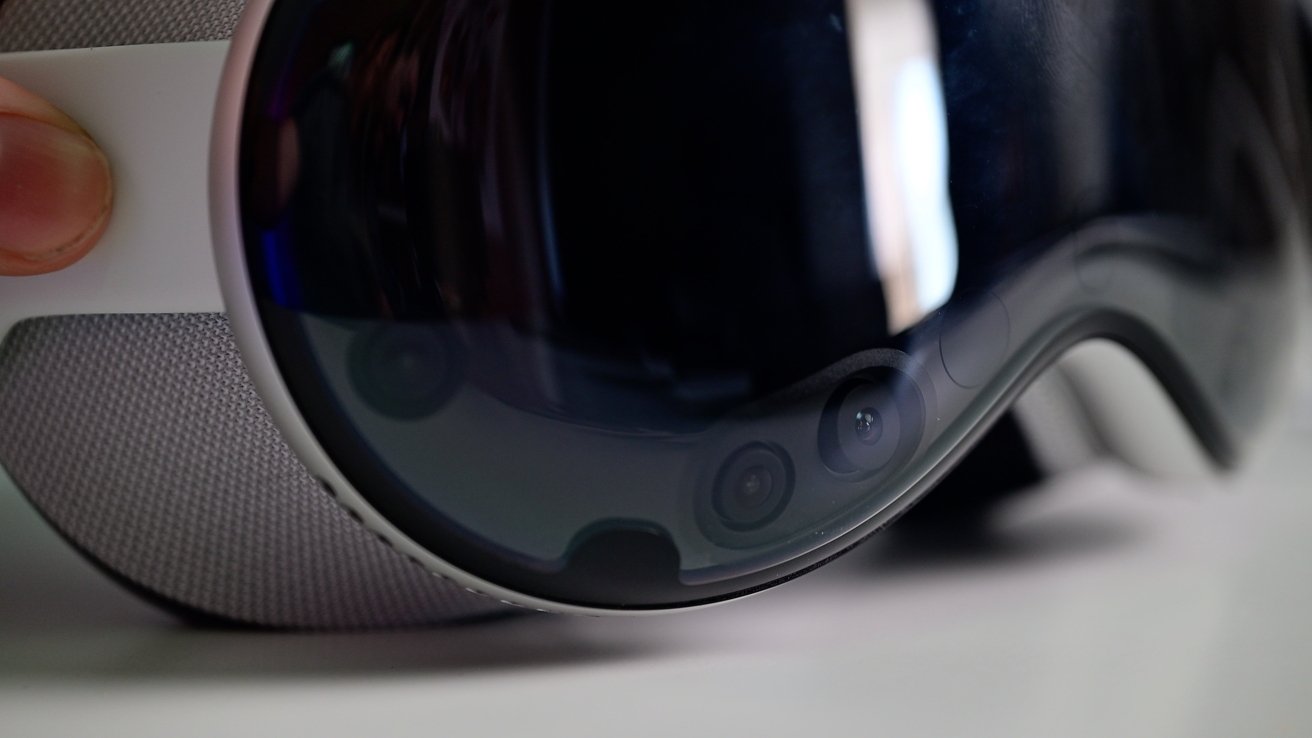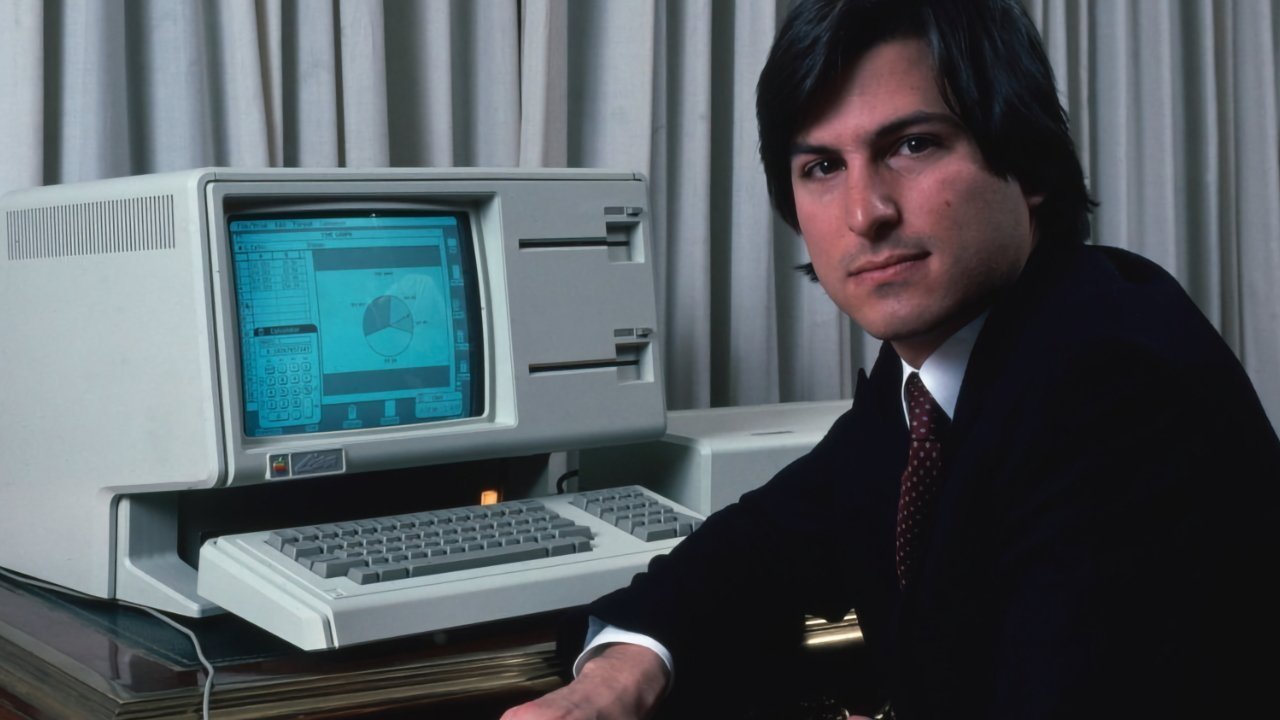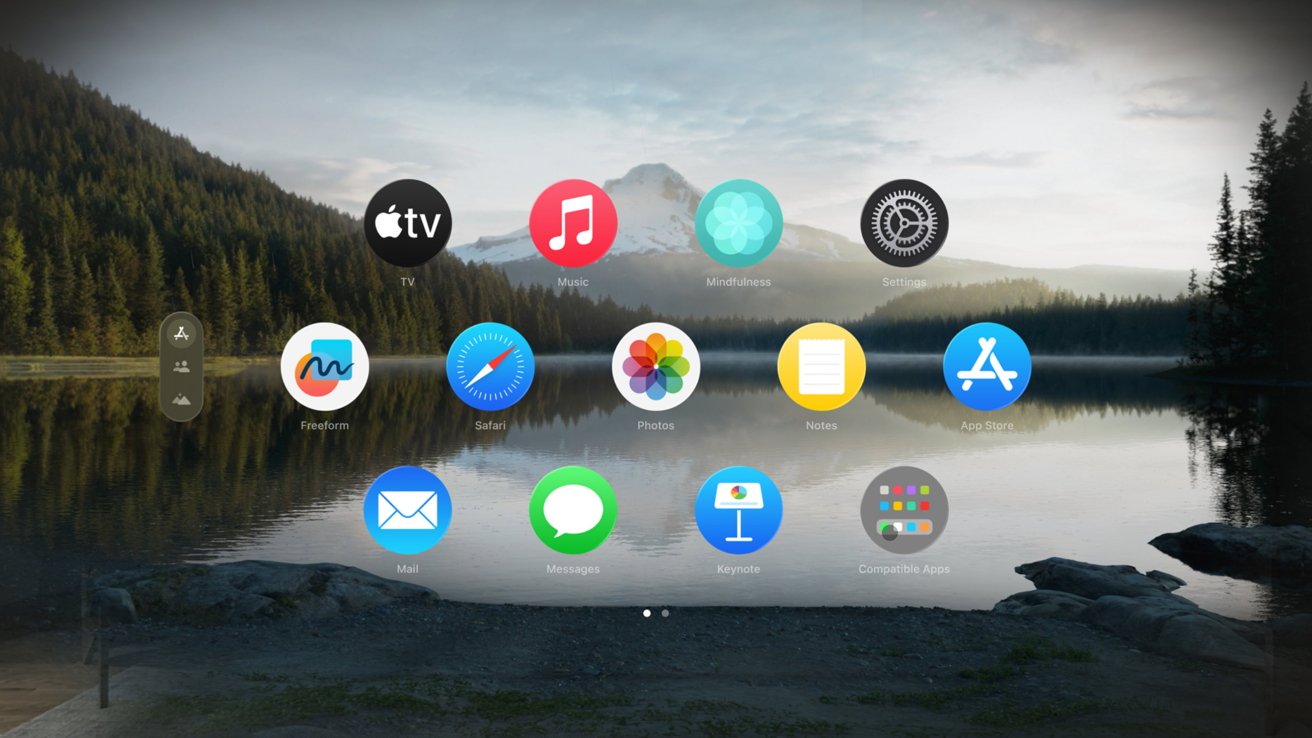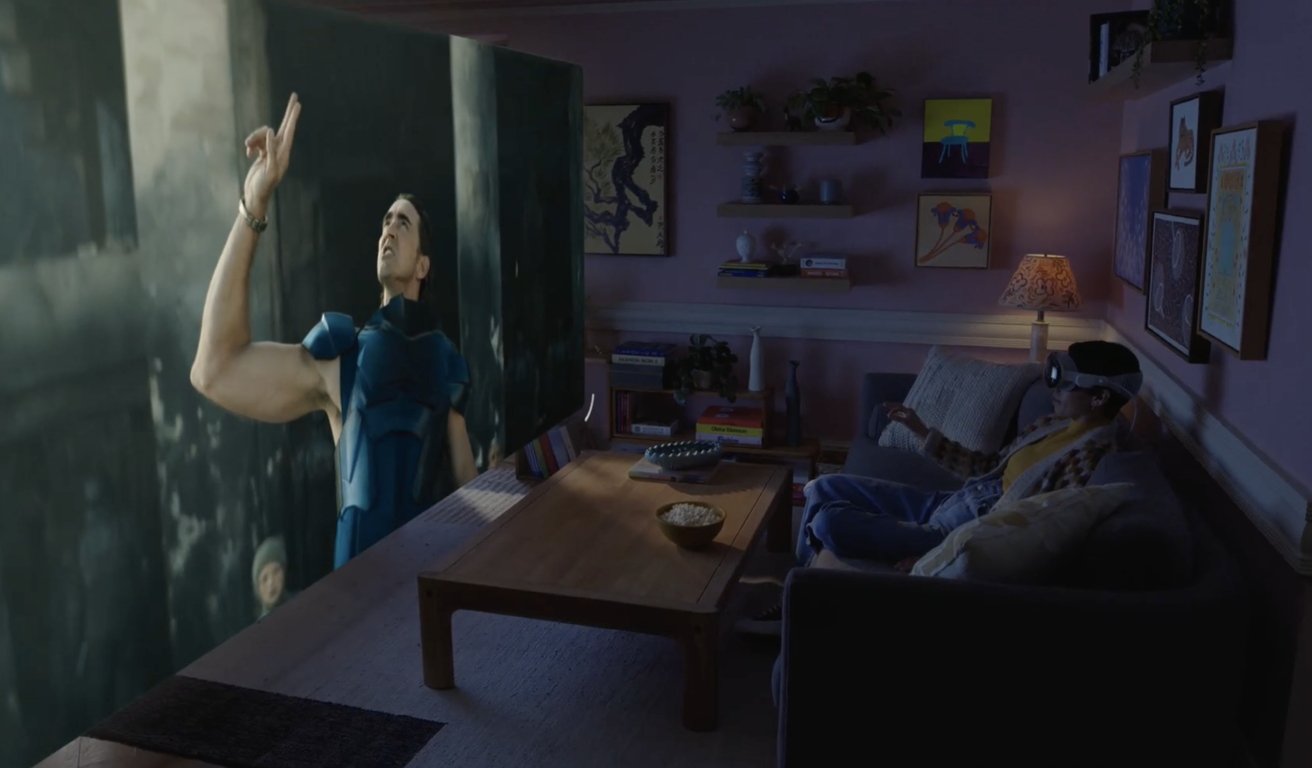Apple Vision Pro will be the platform for the killer VR app, not Meta
Ever since the dawn of personal computing, there has always been a worry about how the public could be tempted to buy new hardware until there was enough new software written for it to make it demonstrably useful. Apple, not Meta, is in a prime position to make this happen with VR.

Apple Vision Pro is hungry for content
Early advertisements for home computers often suggested that buyers would be laying down $2,000 or more to streamline their food preparation. Presumably, the ads suggested it could possibly make some sense to place a steel box, bulky CRT monitor and various cabled drives and other peripherals next to boiling water, steam, and other heat sources as well as sticky sauces, fluffy powders and other threats to the electronics.
"Computer assisted cooking" was only one of a variety of impractical ideas that Apple floated in the late '70s as it was trying to imagine how people might use their new technology purchases. Fortunately, these clumsy "solutions looking for buyers" were eclipsed by far more practical, powerful tools that unleashed buyers' own creativity and solved real needs.
Perhaps the first showstopper example of a broadly useful application for personal computing was the pioneering spreadsheet that VisiCalc introduced, capable of converting tedious accounting paperwork into dynamic columns and rows of data that could quickly be sorted or calculated and presented in flexible new ways that dramatically simplified historical reporting and future projections.
Software tools that delivered a clear, obvious use case became known as a killer app, capable of dramatically inducing sales of new hardware that buyers identified as necessity to allow them to run a specific title. VisiCalc sold the Apple II for Apple.
Rather than computerizing the kitchen, bath, or the garage, home computers largely ended up in a more practical role installing an office in the home. All these years later, I haven't seen much serious suggestion of a computer in the kitchen until Vision Pro sparked unbridled speculation on how it might possibly justify its use. Perhaps making pancakes? Driving a Tesla? Walking your robot dog across the street? All killer apps in a different respect!
A killer platform for apps
Early in Apple's formative development, it appeared clear that outside third party developers could identify and build real applications for computers better than Apple itself could. That focused Apple on looking for "enabling" technologies that could attract development, rather than trying to dream up all of its own software.
At the same time, at the release of the original Mac in 1984, Apple began building much more sophisticated software into its hardware to support the creation and deployment of more powerful new third party software, as I noted in January.
Unlike a simple DOS, the Mac's System Software supplied a series of code libraries or "toolboxes" that developers could access to perform many of the common functions of the system. The result would be that software titles would all look and work consistently, because it was mostly Apple's own code drawing the overall interface, handling printers, providing access to the network, and so on.
This novel software model was first introduced on the Lisa -- the original Mac's short lived predecessor -- which also shipped with a broad set of Office productivity software Apple had written. Apple bundled so much ready-to-use free software for Lisa that the company grew worried that there might not be enough opportunity left for third party developers.

Steve Jobs with a Lisa, the original Mac's short lived predecessor
That prompted the company to hold back its own bundled software with the Macintosh in 1984, and instead work with third party developers to deliver a range of titles users could buy after their hardware purchase.
For years, Apple continued this philosophy of restraining its own bundled software offerings so as not to step on the toes of its third party developers.
The Mac-killer platform
By the mid '90s, Apple was increasingly building expensive to develop software fundamentals, and allowing third party developers to earn revenue using this code, essentially for free. Meanwhile, it struggled to sell macOS as a retail product.
Developers were making more money off the Mac and Apple's software than Apple was.
Among the companies making more from the Mac than Apple was Microsoft. It ultimately decided to appropriate all of Apple's work to deliver Windows on the IBM PC.
At that point, Apple was not only giving away its code for free, but forced to compete with a knockoff of its entire platform. Even worse, key Mac developers were leaving Apple to devote their efforts to making software for Windows.
For many years, Apple struggled with the conundrum of how it could invest in building new macOS software and get users to pay for updates, and at the same time, build its own first party apps that might compete with third party offerings and push even more developers away from its platform. The problem of Apple coddling its developers at its own expense and detriment was finally resolved by iPod.
iPod kills open third party development
Unlike the Mac, iPod shipped as complete system package, updated on a regular basis with first party functions such as calendar, contacts, and notes. Returning to how the Lisa was delivered, iPods were a ready to use package that didn't reply on third party developers.
Third party games were only later made available in partnership with a few specific developers. They were sold through iTunes where Apple could earn a cut of their revenues.
When Apple introduced iPhone, it was again in the same model as Lisa -- bundled with a full suite of ready to use apps. The next year, Apple's new App Store opened the door to initially quite whimsical third party apps from games to fart sounds and pretend beers. The serious apps on iPhone were from Apple: Maps, Mail, Messages and so on.
As third party developers started delivering more consequential and useful apps that sold for real money, Apple began charging a cut of their revenues to help pay for the development of iOS, its development tools, and the App Store itself. This was the same model employed in selling songs, videos, and games in iTunes.
This proved to be wildly successful for Apple, and helped to deliver regular, fresh advances in iOS that helped keep iPhones rapidly refreshed and competitive.
At the same time, third party developers were able to sell large quantities of their apps for relatively little, earning sustainable profits for their work. Writing and maintaining similar software for personal computers had often been far less profitable due to piracy, particularly for small and specialized niche developers.
The iOS App Store had solved major business model problems that had repressed the development of the Mac and had thwarted the development and interest of third parties.
The App Store kills it
Apple's wildly successful model of software distribution and sales through the iOS App Store was subsequently copied by Microsoft as it belatedly realized it needed to mimic Apple's nimble strategies to avoid dying out as a dinosaur stuck in the mud because it had devoted too much attention into eating everything and had not invested sufficient efforts into strategically planning for the future or adapting to a changing environment. It was already too late for Windows Mobile.
The App Store model of sharing a revenue cut from developers was even adopted by Google's Android. Despite portraying themselves as a collective of pirate anarchists who want unrestrained open chaos, Android enthusiasts really just want a copy of Apple's iPhone, but don't want to pay for it.
A big part of the value of iPhone is the quality and curation of its App Store. Google rolled out free version of it, which is not exactly what non-payers wanted. Nobody wants the free version.
Even app developers that pretend they want an "open App Store" really just want Apple to run the App Store and iOS platform at its own cost, like a shopping mall that lets vendors set up shop to profit without paying any rent to cover the shared costs of running a marketplace.
Epic Games and the EU's Spotify don't want to build their own platforms or use a free platform like the web. They just don't want to pay Apple for delivering a platform of premium customers and building and maintaining their development tools.
The are, effectively, App Store squatters.
The Killer App Store
With the release of Vision Pro, Apple is again harkening back to the days of Lisa. Just like iPod and iPhone, the new unit ships with a full assortment of Apple's own software.
Vision Pro ships with Mail, Safari, Messages and all the other front page apps from Apple, with some of the most obvious uses for Vision Pro being delivered through Apple TV+.

Apple apps on Vision Pro
That's right: if you thought Apple TV+ was largely an effort to compete with Netflix in selling subscriptions to access large quantities of low quality shovelware entertainment, you were no smarter than all the analysts!
Apple was instead creating a new market for original and exclusive content. While the obvious goal of any market is to facilitate sales, Apple is known for building a quite famous market -- iTunes -- that it explicitly stated was originally aimed at breaking even, with the intent of making sure that high quality content would be available for iPods and Mac users, and later iOS devices.
Apple TV+ as an app and a marketplace -- or perhaps we could just say "source" -- of content, was an essential element to show off the value of Vision Pro. If Apple had rushed its hardware to market and then waited for third party production companies to create content for it, it would have been a flop on the order of similarly lazy, speculative VR moonshots that flung their astronauts out on trajectories without sufficient food or oxygen to get anywhere and live to tell.

Apple TV+ on Vision Pro
The same way that iPod needed iTunes to exist first, Vision Pro needed a content store capable of delivering blockbuster 3D movies as well as new, original content shot in Apple Immersive Video. The former was fairly easy, and Apple could even lean on Disney+ to deliver that.
But nobody is making significant volumes of new content that can demonstrate the utility, value, novelty and excitement related to immersive 8K video.
Existing surround video for VR helmets only aimed to deliver good-enough content for video game-quality headsets from companies like Sony, HTC, and Meta. Neither Apple nor anyone else could deliver new, much higher quality immersive video delivery hardware and expect the existing producers to jump to deliver high quality content just for them, when the installed base of all VR devices was so much lower.
Perhaps this calls to mind launching Macs in a sea of DOS PCs, or iPhone in a market of JavaME handsets, or Spatial Audio in a world of stereo MP3s.
Apple had to invest lots of money and infrastructure into building a higher tier of video specifications to not only make use of its new Vision Pro hardware, but to create original content that required it. This was a tall order. Today, in month two of Vision Pro, there's only the beginning of Apple Immersive Video yet available.
But like the early days of Apple TV+ or the iOS App Store, today's trickle of content will continue to expand and develop over time, giving Apple the first and largest high quality market for immersive video, and the only hardware that can play it at full quality -- if Apple were to launch its Apple TV+ on other VR headset platforms.
The Killer 3D App Store
While those pieces are falling into place, Apple has been promoting 3D movies in iTunes, including a free selection of blockbusters you can try ranging from Gravity to Mad Max to recent Star Trek and Jurassic World releases. They are phenomenal.
Over a decade ago, I tried to get into 3DTV movies, and 3D BluRay, and 3D PlayStation games. But the problem with the state of the art in 3D back then was that 3D effects on a TV aren't really that compelling. It feels like a short term novelty that one tires of quickly.
Yet the industry kept at it, along with theaters hoping that 3D glasses could coax audiences off their couches and into showings.
The result has been a solid decade of increasingly better 3D movie releases and refinements to the technology to add stereo imaging to a wide range of titles, with 3D ranging from bombastic to subtle. Ironically, it's now quite difficult to find 3DTVs or any way to watch them at home, and many people like me who tried to like 3D walked away with the feeling that 3D was just a silly fad.
That gives Apple quite amazing timing, as it launches Vision Pro with a hunger for showing off binocular content. There's a lot of 3D movies that were created to dazzle audiences on the big screen, just as Apple delivered a really high quality, virtual big screen you can wear pretty much anywhere.
Wearing Vision Pro is more cumbersome than the thinnest active matrix 3D glasses you can get for a 3DTV -- if you can still find any available. But the effect it delivers is astronomically better. It's not just a 3D effect on a flat display, but a feeling a reality that can be depicted as large and as immersive as you can imagine -- even larger than your house could physically accommodate!
If you haven't tried out Vision Pro yourself, it's difficult to describe how much of a major leap in display experience it delivers. It's not just a technical jump past where the puck was in VR, but also delivers a major leap in television. More correctly, a series of leaps: vastly larger, incredibly detailed, immersive and also potentially interactive.
Beyond delivering new level of immersive, 180 degree "you are there" immersive television, Apple also effectively adapted iPadOS and Mac display sharing to add familiar desktop computing in and around your virtual space. And beyond that, it also delivered to tools to create new immersive apps and interactive experiences, few of which have yet been delivered.
The ones that have are earth shattering. Immersive apps let you interact with expensive or even non-existent equipment. Immersive videos that jump off the fixed timeline of film to become interactive. And static immersive films that transport you to places you've never had access to, such as standing next to celebrities in their studio performing just for you, or sporting events where you have better seats than can even exist, because you're seeing what a camera above the goalpost recorded, in Immersive Apple Video created just for your Vision Pro.
Give that billionaire enterprises ranging from Europe's star music stream rental firm, to one of the most popular mobile game developers, to the largest social media firm, and the global monopolist of surveillance advertising have all been unable and unwilling to deliver their own high quality, functional app platforms for basic phone and tablet apps, It would be wildly absurd to suggest anyone will spend the kind of money Apple has to build the next platform for immersive content, and also the market for that content, and also the production of that content.
Meta devoted massive billions to create what it imagined would be the killer app for VR: a metaverse mall. You can watch 3D movies on various VR headsets, and can currently play more immersive VR game titles on them than you can on Vision Pro, at least without screen sharing of some sort. The future of immersive content, and particular interactive app software, requires a killer app store, not an empty mall of creepy avatars.
The future of immersive content, of 3DVR, demands a higher tier of content quality and a functional marketplace customers already trust and already use. Given Apple's track record with iTunes, the iOS App Store, and Apple TV+, it sure looks like Apple is positioned to commission and deliver this new kind of content to premium customers who want it.
Read on AppleInsider




Comments
"Even app developers that pretend they want an "open App Store" really just want Apple to run the App Store and iOS platform at its own cost, like a shopping mall that lets vendors set up shop to profit without paying any rent to cover the shared costs of running a marketplace.
Epic Games and the EU's Spotify don't want to build their own platforms or use a free platform like the web. They just don't want to pay Apple for delivering a platform of premium customers and building and maintaining their development tools.
The are, effectively, App Store squatters."
Nailed it.
The worst part of the EU's strategy of "punishing the winners" in competitive markets is that it stifles innovation in the marketplaces within their own purview. Doing big things, creating something out of nothing, and taking big risks with no guarantee of success or profitability requires an incredible investment in time and resources but also massive sustained commitment to seeing it through to completion. Who is paying for this? Those who take the risks and bear the risks and expenses are the ones paying. If the rewards for being successful are eroded or hijacked by regulators who step in after the success is seemingly achieved, and effectively take over control of the company and how it conducts business, why would other innovators take on those risks in the first place? Success is neither guaranteed nor assured going forward. Disruptive innovation can happen to anyone, except perhaps things owned by or controlled by regulators and governments.
Apple is a for-profit company in several highly competitive markets. Each of these markets have strong competition. Apple isn't necessarily the marketshare leader in the markets it serves. They are however the quality leader and most admired competitor in the struggle for customers and they have very high customer loyalty. Customer loyalty is a direct and measurable feedback loop. High customer loyalty means your customers like what you're doing and are confident that you will continue to do the same in the future. Why would anyone want to mess with this fundamental and customer driven regulatory mechanism and break the customer feedback loop? Once you've taken customers who decide whether you survive or go bust out of the control loop the system is broken and you've done nothing other than to create another regulated public utility, i.e., the customer no longer has a choice.
If the regulators truly believe that they are entitled to manipulate the competitors and decide who wins and who loses they should also accept responsibility for compensating competitors who fail in their attempts at achieving success. If you're deciding who wins and who loses you have responsibility to all parties in the regulated system you've created, winners and losers. I hear that Apple may have invested around $10B USD in their attempt to build a vehicle. They failed. So when should Apple expect a big check to arrive in the mail from the EU regulators to compensate Apple for their loss? After all, they are manipulating the competitive landscape in a way that rewards Epic and Spotify for their inability to compete based on their own abilities, merits, and inability to create their own systems and infrastructure needed to control their own destiny, like Apple has done.
Apple invested billions of dollars and a large amount of time and resources to crawl out from under Intel's and Google's thumbs by creating their own chips and mapping software so they could better control their own destiny. Apple never called in the regulators to force Intel to change their terms and conditions with Apple when Intel was their only source of chips. Apple recognized that they were not happy to be beholden to Intel so they did something about it. On their own. Using their own money. That's how competition should work.
I've heard many saying that the Quest headsets are "really good", but has a game come out on top with AVP where the experience can't be beat?
====
"ready-to-use"
"third-party"
(Why are hyphens often being forgotten by the editors?)
we are hungry to buy the device, but not for 3500
AVP: Will it be medical, defense, geospatial, engineering, or? Games are obvious, but the device is too expensive. Seems Apple is currently selling it as an add-on for rich couch potato singles and anti-social knowledge workers. AVP has to do something better than other solutions. It needs a killer use - a reason to exist.
The Killer App is a myth. Vison OS is the killer app
The two biggest issues Apple needs to address is a true integration with MacOS for productivity users and slave headsets for families to share the experience.
I think those are the biggest issues not the price.....the price will come down substantially soon enough.